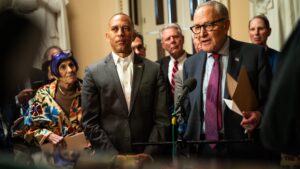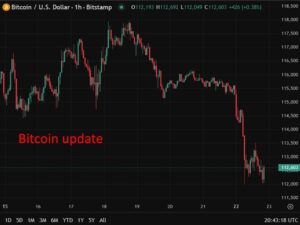WASHINGTON: Fresh US consumer inflation data published Wednesday is unlikely to sway the Federal Reserve’s plans to leave its key lending rate unchanged, but could alter how many rate cuts policymakers pencil in for this year.
The annual consumer price index (CPI) came in at 3.3 percent in May, down 0.1 percentage point from April, the Labor Department said in a statement — slightly below expectations.
But despite the small decline, inflation remains firmly above the Fed’s long-term target of two percent, raising the chances that the US central bank will vote to hold rates at a 23-year high of between 5.25 and 5.50 percent later on Wednesday, and wait for additional clarity that inflation is easing.
The Fed’s day of interest rate deliberations began as scheduled at 9:15am local time (1315 GMT), the Fed said in a statement.
“We expect guidance from the Fed to signal a prolonged pause as the bar for hikes or several cuts remains high,” Bank of America economists wrote in a recent investor note.
The US Fed has a dual mandate from Congress to tackle inflation and unemployment, and recent data suggest it remains broadly on track to manage both without pushing the United States into recession.
With cuts almost certainly off the agenda for this meeting, Wednesday’s action is likely to center around the economic forecasts from the 19 members of the Fed’s rate-setting Federal Open Market Committee (FOMC), which will be updated for the first time since March.
Analysts are looking to FOMC members to lower their individual forecasts for where rates will be at the end of the year in a chart known as the “dot plot,” bringing down the median — or middle — number of projected cuts this year from three down to two or fewer.
“We continue to expect the first rate cut in September,” Goldman Sachs chief economist David Mericle wrote in a note to clients published on Sunday.
His team at Goldman sees the Fed moving to ease monetary policy every quarter after that, meaning a total of two 0.25-percentage-point cuts in 2024, and four in 2025.
“It only takes one dot moving higher to shift the median up to two 25bp (basis point) cuts — which is our base case,” economists at Citi wrote in a recent investor note.
“We’d be surprised to see the Fed drop two easings, but it’s possible,” economists at Pantheon Macroeconomics wrote in a note to clients on Tuesday, while also predicting the FOMC will forecast a median of two cuts this year.
Other analysts, including economists at EY and Barclays, expect the updated forecasts to show a median figure of just one rate cut for 2024.
“We anticipate the dot plot of median rate expectations will feature only one 25 basis points (bps) rate cut in 2024,” EY chief economist Gregory Daco wrote in a note to clients.
If the forecasts were to show just one cut this year, it would mark a significant shift from December, when inflation appeared to be firmly on the path towards two percent, and the financial markets were preparing for as many as six rate cuts this year.
Following Wednesday’s inflation data, futures traders raised their expectations of an interest rate cut by mid-September to almost 70 percent, up sharply from around 50 percent a day earlier, according to data from CME Group.
Fed chair Jerome Powell has insisted in past public comments that the FOMC will remain “data-dependent” in its decision-making and will not be swayed by politics.
Nevertheless, a September start to rate cuts would almost certainly thrust the Fed into the middle of a fractious presidential campaign between President Joe Biden and his likely Republican opponent, Donald Trump, who has repeatedly questioned the US central bank’s independence.










